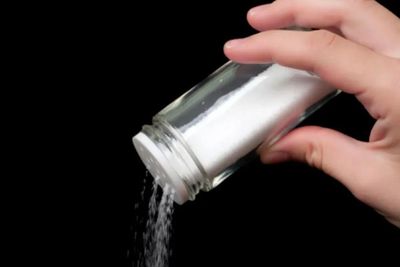"I guess we're going to have to cook a lot of our own dinners from now on, since Mom is not going to be using salt."
My younger son told me that his older brother muttered this to him after reading all about my trip to Pritikin. You see, my empty nest fills back up usually on Sundays. My sons come home to roost for the night and enjoy a big family meal. The way I see it is that these two 20-something busy boys on a budget rarely get to eat good food, so why not make it a special night for them?
If you're reading this post, my dear sons, I will credit you here publicly and say this: you got that right. Be prepared.
There's been so much in the news about salt as a culprit. About two years ago, I interviewed Michael Jacobson, the founder of Center for Responsible Nutrition, after his office contacted me to see if I would write a story on salt for AARP Magazine. (The magazine didn't bite, but nonetheless I never quite forgot Jacobson's passion for the subject and some of the scary details).
Yet, despite that enlightening interview and the attacks that salt has been under, I didn't really change my habits all that much. They were never that bad to begin with, I thought. After all, I never use a salt shaker at the table. When I go to a restaurant I always ask for "no added salt." I buy low or no-salt varieties of foods. I am not a person who likes salty food; I much prefer sweet.
My salt was coming from somewhere, though, since I developed pre-hypertension and was put on a diuretic. (Did you know that almost 80 percent of our salt comes from processed and restaurant foods? Apparently, neither did I).
But this week I finally got it.
This week, I'm eating fresh foods prepared with no added salt. You won't find a salt shaker anywhere here; instead there are huge pepper mills on each table plus a variety of hot sauces, fresh herbs and a wonderful, thick aged balsamic vinegar.
And while I truly am enjoying the food and don't even miss the salt, what I'm enjoying even more is this: just two days into this new style of eating, I'm off my blood pressure medication. Not only that, but my blood pressure was never this low even WITH my medication. Now, if that's not evidence of salt's effect on blood pressure, I don't know what is.
Oh, it's just high blood pressure, I can take a pill for that, you might think. But tell me this: if a smoker had a cough, would you recommend they take cough syrup, or lay off what's causing the cough in the first place? Here's a shocking finding:
A recent University of Southern California study found that reducing salt intake by 1200 mg/day (or less than one-third) would save as many lives over the next 10 years as if ALL AMERICAN SMOKERS QUIT TOMORROW, FOR GOOD.
There's so much more to tell, but I'll try to be brief and highlight the most shocking - and important - facts, courtesy of James J. Kenney, Ph.D and registered dietitian, Pritikin's Nutrition Research Specialist.
Salt kills far more Americans than tobacco (or anything else).
Salt toxicity and subsequent hypertension (HTN) is the number 1 destroyer of kidneys.
HTN and salt toxicity are major causes of the 1.5 million heart attacks each year.
HTN is a major risk factor for stroke and senility.
This matters> Research shows that cutting sodium intake to about 1,200 to 1,500 mg/day (depending on age) would virtually eliminate hypertension and other ills caused largely by added, or second-hand, salt. Did you know that one plate of restaurant food can pack between 5,000 and 7,000 mg. of sodium?
Do you know how much that is? Hint: not all that much. The facts are here:
1/4 teaspoon salt = 600 mg sodium
1/2 teaspoon salt = 1,200 mg sodium
3/4 teaspoon salt = 1,800 mg sodium
1 teaspoon salt = 2,300 mg sodium
How to cut the salt? The best way is to eat more fresh, unprocessed foods like fruits, veggies, beans, low-and-non-fat dairy products, and lean cuts of meat and poultry.
Government health experts estimate that deep cuts in salt consumption could save 150,000 lives a year.
That innocuous-looking, tiny crystal never before seemed so threatening.
Click here for more information about shaking the salt habit.
Read Less Salt, Longer Life?
Essential Facts You Need to Know About Salt: Before You Pick Up the Shaker, Read This!
June, 10 2010
Cardiovascular DiseasesHealthyWomen content is for informational purposes only. Please consult your healthcare provider for medical advice, diagnosis or treatment.

Everything you need to know about women’s health — in one place.

HealthyWomen’s Holiday Gift List
Check out our staff picks for great gifts to give this year
December, 05 2024
Your WellnessiStock.com/chrupka
Freedom to Breathe: Disparities and COPD
Your socioeconomic status, racial background and even your sexual orientation can increase your risk of developing COPD. An expert explains why.
December, 04 2024
Conditions & TreatmentsiStock.com/bymuratdeniz
Women and COPD
Chronic obstructive pulmonary disease is affecting more and more women — and it hits them harder than men
December, 04 2024
Conditions & TreatmentsiStock.com/carolthacker
True or False: Urothelial Bladder Cancer
Take our quiz to test your knowledge of bladder cancer and learn how to decrease your risk
December, 04 2024
Conditions & Treatments